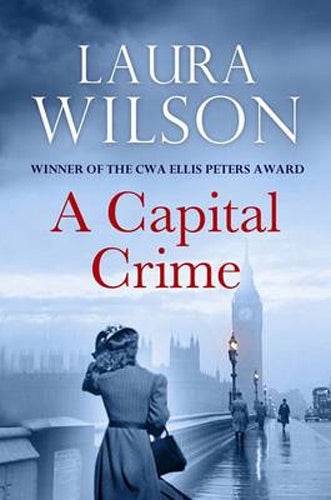A Capital Crime, By Laura Wilson
Secrets and lies in post-war London

Your support helps us to tell the story
From reproductive rights to climate change to Big Tech, The Independent is on the ground when the story is developing. Whether it's investigating the financials of Elon Musk's pro-Trump PAC or producing our latest documentary, 'The A Word', which shines a light on the American women fighting for reproductive rights, we know how important it is to parse out the facts from the messaging.
At such a critical moment in US history, we need reporters on the ground. Your donation allows us to keep sending journalists to speak to both sides of the story.
The Independent is trusted by Americans across the entire political spectrum. And unlike many other quality news outlets, we choose not to lock Americans out of our reporting and analysis with paywalls. We believe quality journalism should be available to everyone, paid for by those who can afford it.
Your support makes all the difference.Justice is in short supply for one of the characters in Laura Wilson's new novel. Does Wilson herself need a touch more? Just how much comfort does it offer her to know that she is regarded as one of the country's most acute psychological crime novelists? Such books as The Lover and An Empty Death glean critical plaudits, but largely remain caviar to the general.
A Capital Crime is the most fully achieved book Wilson has written. For a start, there is the setting: an astringently conjured post-war London, all sooty yellow skies, damp-mackintoshed, grumbling queues and demob suits. Wilson has a Larkin-like eye for the telling detail. Then there's the plot, riffing on the Christie murders, with a cast of characters leading lives of quiet desperation.
A young man, John Davies, tells the police in Merthyr Tydfil that he has murdered his wife and baby daughter in London. Shortly after, Davies changes his story: the killings, he now says, were carried out by his pompous neighbour Norman Backhouse, a special constable in the war. Davies is not believed and is subsequently hanged, but a series of grisly discoveries comes to light, and two possibilities appear: a miscarriage of justice and the threat of more brutal killings.
Dealing with the lies and bloodshed are two solidly realised protagonists. The first is tenacious DI Ted Stratton, a copper given to neither alcoholism nor anti-establishment bolshiness. Wilson studiously avoids cliché with the understated Stratton, although his widower status here recalls other literary coppers. But the most striking figure is the ex-MI5 agent Diana Calthrop, prone to a series of ill-advised judgements about men. Her problems here are prodigious: financial, emotional and physical, as she comes within the orbit of a ruthless killer.
Was Wilson right to have her characters echo so closely their historical precedents? The semi-literate, ill-starred John Davies is clearly Timothy Evans, while the devious petty official Backhouse suggests John Christie. Run-down Paradise Street is a coal-hole away from Rillington Place. But if A Capital Crime initially draws its material from real-life murder and duplicity, Wilson ultimately offers a persuasive refashioning of history and moves into dark terra incognita. Don't think that because you know the facts of the Christie case, you'll be outguessing Detective Inspector Stratton. But you'll enjoy trying.
Join our commenting forum
Join thought-provoking conversations, follow other Independent readers and see their replies
Comments